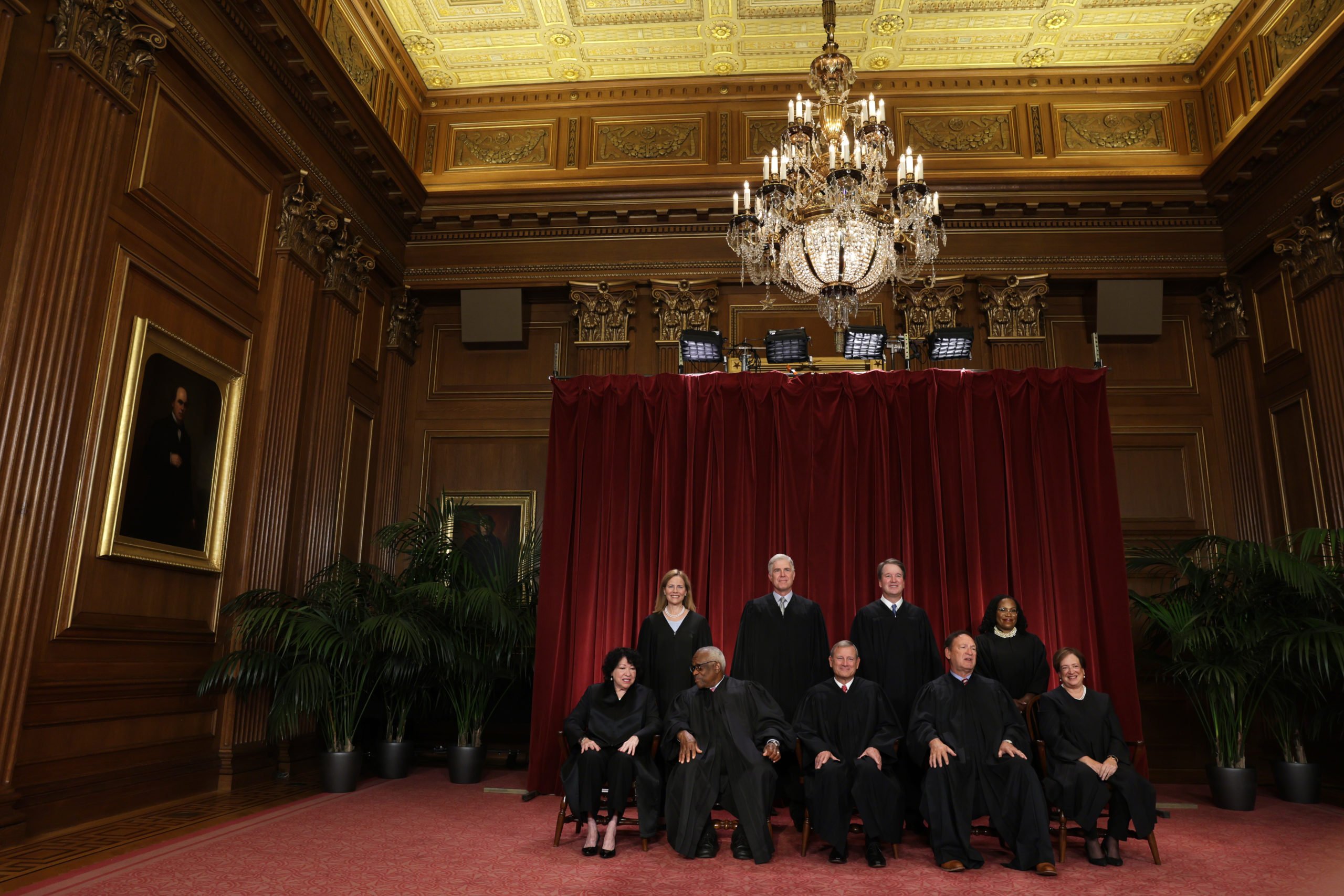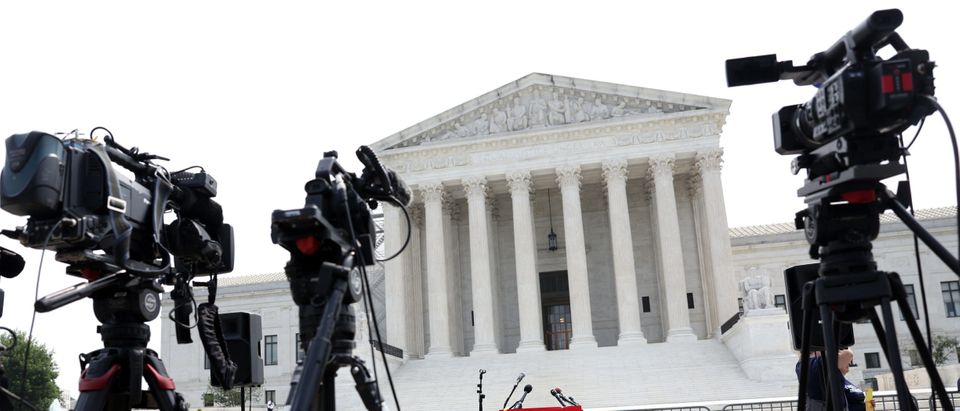The Supreme Court blocked the affirmative action policies of Harvard and the University of North Carolina Thursday on the grounds that they violated the Equal Protection Clause of the Fourteenth Amendment, prompting outrage from liberals who support racial discrimination in admissions.
Universities decried the decision as a blow to racial diversity and American ideals, as did prominent Democratic politicians and liberals in the media. The text of the ruling, written by Chief Justice John Roberts and joined by Justices Clarence Thomas, Samuel Alito, Neil Gorsuch, Brett Kavanaugh and Amy Coney Barrett, reveals a commitment to colorblind racial equality on the part of the Court’s majority. (RELATED: ‘Cancerous To Young Minds’: Clarence Thomas Torches Ketanji Brown Jackson’s Dissent From Affirmative Action Ruling)
ELIMINATING RACIAL DISCRIMINATION — ALL OF IT
“Eliminating racial discrimination means eliminating all of it,” the decision read. “Accordingly, the Court has held that the Equal Protection Clause applies ‘without regard to any differences of race, of color, or of nationality’— it is ‘universal in [its] application.’ … For ‘[t]he guarantee of equal protection cannot mean one thing when applied to one individual and something else when applied to a person of another color.’”
“Permitting ‘past societal discrimination’ to ‘serve as the basis for rigid racial preferences would be to open the door to competing claims for ‘remedial relief ’ for every disadvantaged group,'” the decision read. “Opening that door would shutter another—'[t]he dream of a Nation of equal citizens . . . would be lost,’ we observed, ‘in a mosaic of shifting preferences based on inherently unmeasurable claims of past wrongs.'”
RACE-BASED ADMISSIONS
The majority opinion noted the large discrepancy in admission rates by race between applicants of comparable merit.
“According to [Students for Fair Admissions’] expert, over 80% of all black applicants in the top academic decile were admitted to UNC, while under 70% of white and Asian applicants in that decile were admitted. In the second highest academic decile, the disparity is even starker: 83% of black applicants were admitted, while 58% of white applicants and 47% of Asian applicants were admitted. And in the third highest decile, 77% of black applicants were admitted, compared to 48% of white applicants and 34% of Asian applicants,” the opinion read.
Harvard’s admissions discrepancy’s were similar, with black students in the fourth lowest academic decile having a slightly higher chance of admission (12.8%) than Asian American students in the top decile (12.7%), according to the opinion. Black applicants in the top four academic deciles were four to 10 times more likely to be admitted to Harvard than Asian applicants in those deciles.
The Equal Protection Clause demands that race is never used as a negative; in the case of admissions, this means an applicant’s race cannot be used against him, the majority argued. The majority rejected Harvard and UNC’s claims that race was never a factor in their admission decisions.
“The First Circuit found that Harvard’s consideration of race has led to an 11.1% decrease in the number of Asian-Americans admitted to Harvard. And the District Court observed that Harvard’s ‘policy of considering applicants’ race . . . overall results in fewer Asian American and white students being admitted,'” the decision read.

WASHINGTON, DC – OCTOBER 07: The Supreme Court has begun a new term after Associate Justice Ketanji Brown Jackson was officially added to the bench in September. (Photo by Alex Wong/Getty Images)
INTERGENARATIONAL GUILT
“The dissents’ interpretation of the Equal Protection Clause is not new. In Bakke, four Justices would have permitted race-based admissions programs to remedy the effects of societal discrimination. But that minority view was just that—a minority view. Justice Powell, who provided the fifth vote and controlling opinion in Bakke, firmly rejected the notion that societal discrimination constituted a compelling interest. Such an interest presents ‘an amorphous concept of injury that may be ageless in its reach into the past,’ he explained. It cannot ‘justify a [racial] classification that imposes disadvantages upon persons . . . who bear no responsibility for whatever harm the beneficiaries of the [race-based] admissions program are thought to have suffered.'”
THOMAS’ FIERY CONCURENCE
Thomas wrote a concurring opinion “to offer an originalist defense of the colorblind Constitution” and argued against all forms of racial discrimination.
“In the 1860s, Congress proposed and the States ratified the Thirteenth and Fourteenth Amendments. And, with the authority conferred by these Amendments, Congress passed two landmark Civil Rights Acts,” Thomas wrote. “Throughout the debates on each of these measures, their proponents repeatedly affirmed their view of equal citizenship and the racial equality that flows from it. In fact, they held this principle so deeply that their crowning accomplishment—the Fourteenth Amendment—ensures racial equality with no textual reference to race whatsoever. The history of these measures’ enactment renders their motivating principle as clear as their text: All citizens of the United States, regardless of skin color, are equal before the law.”
While the individuals who ratified the Fourteenth Amendment may not have universally believed in racial equality, it is clear that the amendment was meant to forbid all legal distinctions on the basis of race and establish full equality of all people under the law, he argued.
Thomas also offered a firm rebuke to Justice Ketanji Brown-Jackson’s dissent, citing his own experience growing up in the segregated American South to undermine her arguments about the centrality of race to American life.
“Rather than focusing on individuals as individuals, her dissent focuses on the historical subjugation of black Americans, invoking statistical racial gaps to argue in favor of defining and categorizing individuals by their race. As she sees things, we are all inexorably trapped in a fundamentally racist society, with the original sin of slavery and the historical subjugation of black Americans still determining our lives today,” Thomas wrote. “The panacea, she counsels, is to unquestioningly accede to the view of elite experts and reallocate society’s riches by racial means as necessary to ‘level the playing field,’ all as judged by racial metrics. I strongly disagree.”
“Justice Jackson would replace the second Founders’ vision with an organizing principle based on race. In fact, on her view, almost all of life’s outcomes may be unhesitatingly ascribed to race … This lore is not and has never been true,” he wrote. “Even in the segregated South where I grew up, individuals were not the sum of their skin color. Then as now, not all disparities are based on race; not all people are racist; and not all differences between individuals are ascribable to race.”
“Worse still, Justice Jackson uses her broad observations about statistical relationships between race and select measures of health, wealth, and well-being to label all blacks as victims,” he wrote. “Her desire to do so is unfathomable to me. I cannot deny the great accomplishments of black Americans, including those who succeeded despite long odds.”
All content created by the Daily Caller News Foundation, an independent and nonpartisan newswire service, is available without charge to any legitimate news publisher that can provide a large audience. All republished articles must include our logo, our reporter’s byline and their DCNF affiliation. For any questions about our guidelines or partnering with us, please contact licensing@dailycallernewsfoundation.org.


